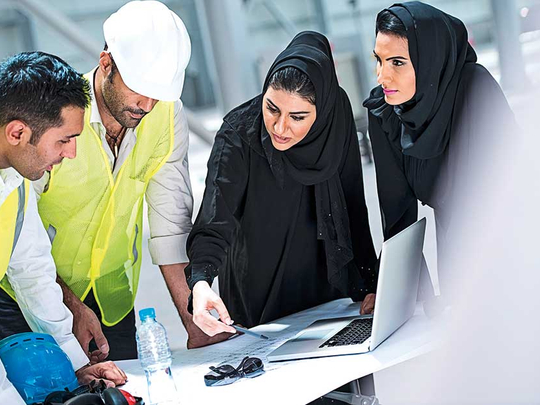
Abu Dhabi: The number of women enrolling for subjects such as computer science and engineering in universities is close to 50 per cent in the Middle East, which is higher when compared to countries such as the US.
This is part of the findings made by a research project undertaken by a professor at New York University Abu Dhabi (NYUAD).
“Enrolment of Arab women in the fields of computer science, engineering and other technology-related subjects is very high, with the numbers ranging between 40 and 50 per cent,” said Sana Odeh, clinical professor of computer science, NYUAD.
“In the Arab world, women are embracing these sectors, in some countries like Palestine, Egypt, Saudi Arabia and even the UAE, it is women who sometimes even make up the majority of students in computer science and engineering [courses],” she added.
Odeh said the numbers were positive when compared to countries like the US, which had a significantly lower rate of women enrolling for these subjects.
“In the US, women enrolment in computer science is around 10 to 20 per cent which is very low. As a result, millions of dollars are being invested to try and attract women into this field.
“One of the perceptions in the US is that computer science is a geeky field, or that it’s a man’s world and that women are not good enough in maths and science. A lot of girls get these perceptions when they are young, when they are in junior high school or even elementary school.
“This is not the case for Arab women: they embrace this sector, they love science and maths, and see the creative solutions offered in these subjects which they can go on to apply to help society. The negative perceptions around these sectors are not there in the Arab world, Arab women do not believe that it’s a man’s world when it comes to these fields,” she added.
Odeh also said that the high number of young Arab women enrolled in technology subjects helped break down stereotypes about women in this region, and could also counteract perceived trends.
“When I came to the UAE 10 years ago and started discovering these numbers, I was pleasantly surprised, and that’s why I started doing the research,” she explained. “With this research, we can dismantle some of the stereotypes that surround women, and instead we show women in a powerful way, that wearing the hijab or not doesn’t have anything to do with the issue.
“The high numbers also show that we have something to offer, that the low number of women enrolled in computer science and related fields is not the international trend, and that we have a good example in the Arab world for why this isn’t the case,” she added.
Odeh said that despite the positive numbers in enrolment, these are not being positively reflected in the workforce, with men still often being preferred to women.
“The problem is that these high numbers do not translate to employment after they leave universities. In the technology sector, what we often find is that employers feel that men are more reliable and will be able to be on the job 24 hours while women may get distracted by children and raising a family.
“So it’s not because women are perceived to lack the skills or that men are better, in many cases the women are actually more skilled and have the higher grades, but the feeling is that they will eventually quit because of family,” she added.
Odeh said steps taken by the UAE government to hire women and to make it a policy to have women involved and integrated into the workforce have brought in positive results.
“The government is very instrumental in employing women, and this is a great factor in the Gulf region. In this area, there is a policy coming from the top that wants women to excel; they have programmes that send women for scholarships, for example; so a lot of effort is being made because there is a top-down policy to employ women.”












